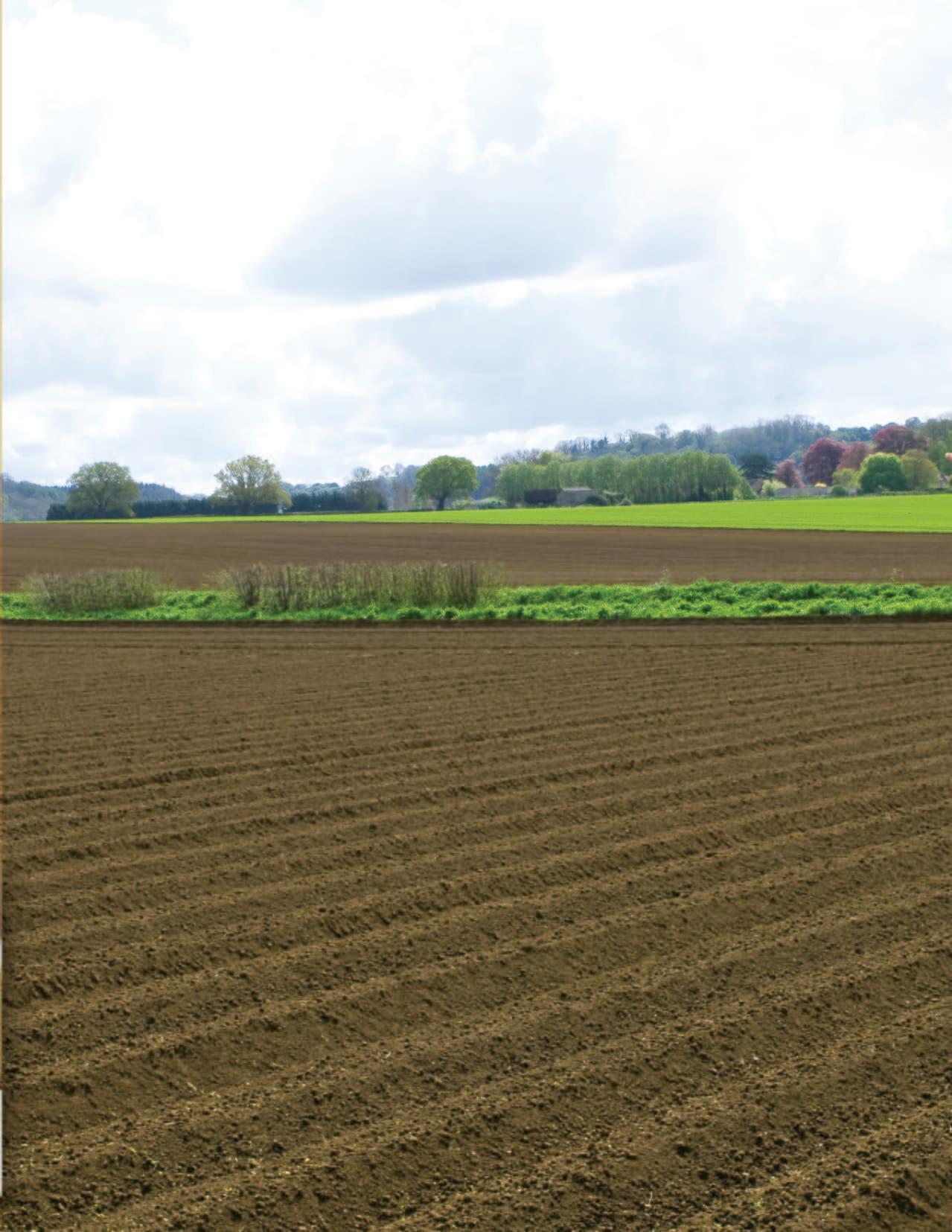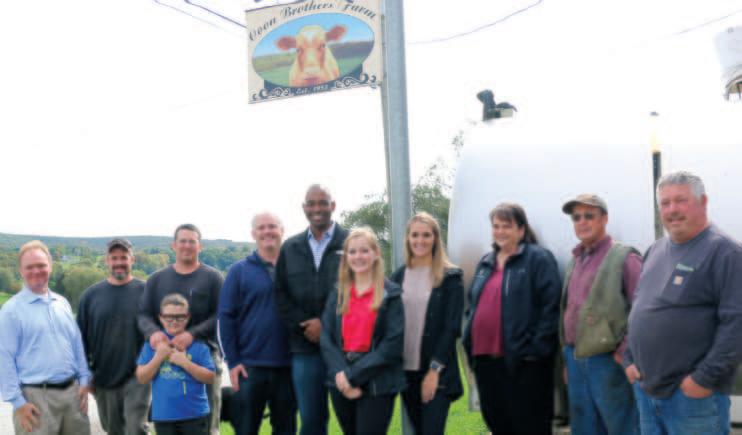
SUMMER 2023 | FARMCREDITEAST.COM INSIDE 2 News & Views 3 CEO Column 4 Cover Story 11 Navigating Tax Policy 12 FarmStart 13 Director Elections 14 Public Policy Update 16 Scholarship Winners 50 Years Delivering ValueAdded Services
Important Dates!
Farm Credit East offices, including online banking and payroll processing, will be closed on the following dates:
• Monday, September 4
• Monday, October 9
Also! Visit us at Empire Farm Days, held Thursday, August 3 through Saturday, August 5 at Palladino Farms in Pompey, N.Y. Stop by the Farm Credit East booth at 316 Lakeview Lane to enter our raffle for a chance to win a Weber Genesis II E-335 gas grill.
Board Election & Reorganization Results

Farm Credit East announced the results of its director elections in late April. Stockholders elected the following candidates to four-year terms.
Amy L. Walker-Bailey, of Fort Ann, N.Y., is chief financial of ficer of her family’s three businesses: Walker Farms, LLC, a 1,300-cow family dairy operation with 2,700 crop acres of hay and corn; MGK Enterprises, LLC, a contract hauling trucking company; and Walker’s Farm, Home & Tack, a retail farm store.
Brett D. Kreher, of Clarence, N.Y., is partner at Kreher Family Farms (and related entities), an egg production business raising approximately two million hens that produce conventional, organic and pastured organic eggs across three locations.
Congratulations to the winning candidates! Thank you to customer-members for voting and to the association nominating committee for providing an excellent slate of candidates.
At the April 25 reorganization meeting, the board reelected Laurie Griffen, of Stillwater, N.Y., as its Chair and reelected John Knopf, of Canandaigua, N.Y., as Vice Chair. In addition to Chair Griffen and Vice Chair Knopf, the Executive Committee also includes Tom Colgan, of Lyme, N.H., LouAnne F. King, Madrid, N.Y.; and James A. Robbins II, Searsmont, Maine.

In 2024, there will be three seats up for election. Learn more about these director seats and how you can become involved in the election process on page 13 of this issue.
Have you signed up for Farm Credit Connect yet? Your digital portal to do business with Farm Credit East
You’ve asked for access to your information at your fingertips, and we’ve listened. Farm Credit Connect provides 24/7 access to your information from anywhere. It also offers enhanced selfservice options, including online banking, which provides a cost savings to the cooperative — and those cost savings can ultimately be returned to you, our members.
Benefits of Farm Credit Connect
• Real time access to loan and crop insurance information

• Securely exchange information with your Farm Credit East team
• Manage farm advisory services, including submitting payroll hours, sharing tax preparation documents, and viewing your completed tax return
• Enroll to receive billing statements and shareholder materials, such as the Annual Meeting Information Statement and Annual Report, electronically — another cooperative cost savings!
• Easily transfer funds and make payments via online banking
Visit FarmCreditEast.com/Portal

2 FINANCIAL PARTNER
Mike Reynolds CEO, Farm Credit East

MILESTONES
Birthdays, anniversaries and other key milestones are an opportunity to reflect on where we’ve been and where we’re going. In 2016, the Farm Credit System celebrated a century of providing reliable credit to our nation’s farmers. But credit is only half the Farm Credit East story. Our members also rely on our robust financial services offerings which came along later. In fact, this year marks 50 years of adding value for our members through Farm Credit East’s financial services.
This Financial Partner issue celebrates this momentous milestone. As you read about the evolution of our financial services, you’ll note a common theme that still rings true today: The creation and subsequent evolution of financial services was driven by our members’ changing needs as their businesses evolved and grew.
Back in 1973, nobody could have imagined that Farm Credit East’s financial services would grow to employ upwards of 180 professionals, generating more than $30 million in revenue. These individuals prepare nearly 13,000 tax returns and provide recordkeeping, payroll, consulting, appraisal and crop insurance to thousands more. This important segment of our business equips Northeast agricultural businesses with valuable insights to help them manage their businesses more effectively.
The evolving needs of our customers have driven recent changes in our business structure. We kicked off 2023 aligning our team’s talents and association resources with our customers’ needs. Financial services are a key part of that change. We now have dedicated financial
services leaders for each region across our territory. Additionally, Jan Bitter was named Chief Financial Services Officer to provide dedicated focus and leadership for this growing segment of our business.
services. Many are names I’m sure some of you will recall. Investing in our talented team continues to be a focus of Farm Credit East.
One way we seek to grow and develop our team is through our intern program. This summer, Farm Credit East is pleased to welcome 12 interns who will get a first-hand look at what it’s like to work at Farm Credit while working on projects to advance our organization. They’ll be getting out to visit customers’ operations this summer, so please share your story with them as they determine the next steps in their career paths.
Later in this issue, we feature this year’s 40 scholarship winners who are studying toward careers in agriculture, forestry, fishing or related industries. We’re pleased to support their wide range of academic pursuits. It is a highachieving group that gives me great confidence in the future of the industries we serve.
We’ve always viewed financial services as a strategic differentiator. Over the past half century, our team has helped members maintain accurate records for compliance and financial management; navigate the complex rules around compensating farmworkers; minimize tax liability; benchmark their business against past performance or their peers; transition their business to the next generation; and manage the inherent risks in agriculture.
As you read the cover story, you’ll note a key driver behind the growth of our financial services was the people we hired to lead those
In closing, I commend the Farm Credit East financial services team who have worked tirelessly over the past 50 years to grow this segment of our business and deliver value to our customers. Congratulations on this exciting milestone!
I also thank our customers for pushing us to develop our skills to meet your needs and for your patience as we continue to evolve our service offerings. Our program would not be where it is today without your continued trust and loyalty.
3 SUMMER 2023
CEO’s MESSAGE
“This important segment of our business equips
Northeast agricultural businesses with valuable insights to help them manage their businesses more effectively.”
50 Years

4 FINANCIAL PARTNER
“[Farm Credit’s] vantage point is unique, [our] knowledge of farm credit is superior, [our] agricultural business knowledge can be superior and ... a well thought out approach to [consulting] may make the difference between success and mediocrity.”
–“A Case for Counseling,” Howell Hughes, March 1963
Delivering Value-Added Services to Northeast Producers

Picture it —
it’s the 1960s. New technologies are being introduced with more processes being mechanized on farms, resulting in increased efficiencies and tighter margins. Agricultural business structures are becoming more complex and multi-faceted. Mainframe computers are also coming into their own for businesses’ general ledger, loan accounting and other calculating processes. Northeast extension services are emphasizing the importance of tax management and estate planning, while beginning to develop farm accounting services to assist the region’s producers.
A long-held tenet at Farm Credit is that solid records are the foundation for business success — and with more complex businesses and operating environments, producers needed accurate records to make informed decisions for the future of their businesses. So, in 1963, Farm Credit leaders convened at the New York State Directors’ Conference. Then Senior Vice President, Howell Hughes of the Springfield Bank for Cooperatives, delivered a speech titled, “A Case for Counseling” (what we’d today call consulting) to discuss Farm Credit’s role in further helping producers during this crucial juncture in agriculture.
And thus began an eight-year journey to the Farm Credit Act of 1971, which authorized Farm Credit associations to deliver related services.
cover story
The Farm Credit Act of 1971
In May 1969, the Farm Credit Administration (FCA) established a Commission on Agricultural Credit tasked with evaluating the Farm Credit System to ensure it continued to meet the fast-changing credit needs of agricultural producers. Among the Commission’s 12 visionary recommendations, was to establish credit-related services. The Commission defined credit-related services to be business services, such as recordkeeping, credit life insurance, and estate planning.
The Commission’s recommendations led to the Farm Credit Act of 1971, which provided the Farm Credit System with Congressional authority to offer credit life insurance, crop-hail insurance, and Agrifax records programs. It also provided the opportunity to propose new services for FCA approval, which was exactly what the Springfield District planned to do.

Sound financial management
In the early 1970s, following extensive research into the best farm records system to provide producers with management information, Agrifax was adopted by most Northeast Farm Credit associations, with the Hudson Valley association leading the charge. Agrifax provided farmers with monthly cash flow reporting along with annual summaries of income and expenses and other year-end reports.
In the mid-80s, the Springfield District launched its own version of the Agrifax Software, known as Agrifax On-Farm (AOF). This modernized version provided a path for those clients who wanted to do some part of their check-writing and bookkeeping on their own computer, but with the support of their local Farm Credit office.
Fast forward 40 years, we now operate online, in the cloud, and can securely exchange

6 FINANCIAL PARTNER
Howell Hughes delivers “A Case for Counseling”
ELFAC electronic farm records introduced by Northeast Cooperative Extension
Hudson Valley association pilots tax service with Dan Galusha & Wayne Bouchard, while also hiring its first business consultant, Norm Coe
St. Paul FICB begins work on software that became Agrifax accounting software, which the Springfield District adopts in 1970
Farm Credit Act of 1971 enacted, including explicit authority for “related services”
Springfield Banks submit Proposal for Farm Tax Service, which is approved in time for 1976 tax season
The primary consideration in offering any service should be the benefit it provides members and the lender in using and extending credit, and not the remuneration which may accrue to
the Banks or Associations.
1964 1965 1971 1975 1973 “
– The Farm Credit System in the ‘70s, The Report of the Commission on Agricultural Credit, March 1970
1963
”
information with customers in real time. “Modern cloud technology has enabled us to provide faster, more efficient service in a secure environment — this is a huge benefit to our customers and our processes,” said Triva Haycook, Farm Credit East Director of Financial Services Operations.
“In the past, recordkeeping was only a process to prepare the tax return, but today accounting records are used for so much more,” Triva continued. “Accounting records are where everything starts — from credit decisions to consultative services, grant opportunities, federal/state benefits, and so much more. With today’s technology, we’re able to equip customers with valuable insights for them to make informed business decisions.”
Minimizing tax liability
Customers had established trust in Farm Credit to prepare their records, but now they needed their taxes prepared, too. So, the offering of tax services promptly followed recordkeeping as Farm Credit quickly learned that it needed to prepare the necessary income tax returns to be credible in the farm records business. The Hudson Valley association again led the charge with the hiring of Dan Galusha and Wayne Bouchard.
Over his 50-year career, Wayne Bouchard witnessed the evolution of Farm Credit East’s tax services. “When I got started, we were preparing taxes with paper and pencil. Today, we operate in the cloud. We scan a W-2 and the information is automatically input on the tax
return, which affords us more time to provide value to the customer — because taxes have certainly gotten more complex,” said Wayne Bouchard, recently retired Farm Credit East Tax Consultant.
“Don’t get me wrong, taxes were complex back then,” Wayne continued. “But not nearly as complex as they are today where there’s an exception to everything, and those exceptions are always changing.”
In drafting the formal tax services proposal for FCA approval in 1975, then Vice President of Marketing and Research, Norm Payne, commented, “Farm Credit is going to set the standard for quality tax preparation

and planning...” It’s this standard that led to the development of a Farm Credit Tax Correspondence Course and subsequent Tax Test. While this curriculum has evolved over time, it continues to be the gateway to accreditation for all Farm Credit East tax preparers (and many other staff).
“Entering information into the program is the easy part,” joked Wayne. “Understanding the law is the challenging part. Fortunately, Farm Credit East has developed a robust, hands-on training program and has a talented team with extensive knowledge of tax laws, especially those specific to agriculture — and stays up to date on changes to those laws.”
 Don Rogers hired as Director of Farm Management Services at the Springfield Banks Springfield District begins offering farm payroll services
Don Rogers hired as Director of Farm Management Services at the Springfield Banks Springfield District begins offering farm payroll services
First Northeast Dairy Farm Summary released 1986 1996
Crop insurance alliance with Chapman-Lampson Agency with initial sales for 1997 crop season
1977 1978
Coon Brothers Farm, LLC
Armenia, NY
Coon Brothers Farm, LLC has been working with Farm Credit East for many years. David Coon has been a partner in the dairy business since 1988 and has nothing but good things to say about the farm’s credit and financial services relationships.

“The people we’re working with now are different than they were back then, but they’re still great people,” said Dave. While the credit relationship was established earlier, the farm later began using on-farm recordkeeping and taxes on the financial services side.
Dave’s father and uncle also worked heavily with consultant, Norm Coe, and laid the groundwork for a successful operation before handing over the reins to Dave and his brother, Peter. “They really had a vision when they handed it to us to take it to the next level,” said Dave. “I hope we’re laying the same groundwork for the next generation as well.”
“However, possibly the greatest value we bring to today’s customers is year-round tax planning — I call it a ‘no surprise tax return,’” said Wayne. “Each and every business decision has tax implications, so we touch base with clients throughout the year to understand their plans and their goals, and can generate projections to aid in their decisions.”
Consulting for business success
As noted at the onset of this article, Howell Hughes first termed this service as counseling However, after receiving word that FCA was not on board with Farm Credit offering “counseling” services (or in other words what they deemed to be legal counsel), the program was quickly renamed to consulting.

In general, consulting was one of the more challenging services to get approved since, in
addition to the legal counsel concerns, FCA had reservations of Farm Credit advisors becoming too involved in farm management decisions. To respond to these concerns, Farm Credit developed an extensive apprenticeship program and set guidelines for the types of reports consultants can provide (i.e., alternatives and options, not decisions) and the required documentation for those interactions. Additionally, it was determined that consulting and credit must be separate business functions. While the delivery model has evolved over time, Farm Credit East continues to abide by these same standards.
After much back and forth with FCA, the Hudson Valley association’s pilot consulting program was approved in 1976, with Norm Coe serving as the association’s first business consultant.
As the complexities of ag businesses have continued to grow, so has Farm Credit East’s consulting program, which today employs a dozen consultants, each with unique skills. Additionally, modern technology has allowed consultants to provide their skills and talents to producers across the Farm Credit East territory.

“Today’s ag business owners are operating at a completely different scale of operations and stressors than 50 years ago, and that pace is only going to continue,” said John Lehr, Farm Credit East Business Consultant. “We help them pause to take a 50,000-foot strategic view of their business.”
Present-day, the farm utilizes the full suite of Farm Credit East financial services, from recordkeeping and taxes to payroll and consulting.
“I can’t put a value on it,” remarked Dave. “The Farm Credit East staff know the ins and outs, and they also have the farm knowledge to go with it. It’s worked really well for us and it’s been a great relationship over the years.”
8 FINANCIAL PARTNER
As pictured in the January/February 1987 edition of Farming magazine, the Coon brothers and sons, of Armenia, N.Y., posed for a picture, with Farm Credit’s Norm Coe (right).
The family dynamic is another important aspect of our consulting services. “The first generation had the luxury of building these businesses to the scale they’re at today,” John continued. “They developed alongside the business and learned from experiences along the way. As a result, generations two and three are entering huge businesses with huge responsibilities — they have a steep learning curve. A consultant helps work through those challenges and develop the next generation for success.”
Abma’s Farm, Inc.
Wyckoff, NJ
Abma’s Farm, Inc. is a fourth-generation farm market in Northern New Jersey. The market has both retail and wholesale components, selling vegetables, eggs, annual and perennial flowers, as well as having a composting business, selling topsoil, mulch and other byproducts.


“My father-in-law began our involvement with Farm Credit about 40 years ago with some credit needs,” said Pam Abma. “As the years went on, we got to a point where our own bookkeeping and knowledge of the business couldn’t keep up with expansion.”
The farm has up to 80 employees during their peak season. Pam says they reached out for help with payroll just over 10 years ago and have never looked back. “We’ve been using the app for the last few years, which is very user-friendly,” said Pam.
During the recession in 2007-08, debt was no stranger to anyone, and the Abmas reached out to Farm Credit East Consultant, Erin Pirro, to help them manage their situation. “Erin came alongside us and helped us create a budget that kept us on track,” said Pam.
Specialized payroll services to maintain compliance
From early on, Agrifax included recording payroll functionality. However, it was the actual payroll calculations and the corresponding software to complete those calculations (Calculating Payroll, or CPY) that led to the start of Farm Credit’s payroll service in the mid-1980s.
Farmers with H-2A guest workers were among the first payroll clients, as they had unique payroll rules and reporting and needed a functional software that met those requirements. While farmers were equipped with the necessary software to complete their payroll, it wasn’t long before they started asking Farm Credit staff to assist with processing, too. Payroll is a demanding function that needs to be completed accurately and on time, typically during the height of the growing season.
In recent years, the consulting relationship has remained important to the business. A few years ago, Pam’s son thought the composting business could save some money if they were to buy a mulch dyeing machine, instead of buying the finished product elsewhere. “Erin had him work through the labor, material and machine cost and how long it would take to pay for itself.” Pam continued, “before, we would just worry if we could make the payments,” but now the Abmas look at each purchase and how it will continually bring value to the business.
9 SUMMER 2023
We work in a secure environment with modern technology, providing self-service options and convenient access to their payroll information.
“ ”
– Andrew Desiderio Payroll Leader
Financial services into the future
A
Message from Jan Bitter, Chief Financial Services Officer

As the Commission on Agricultural Credit stated in their recommendation more than 50 years ago, the priority in developing any financial service should be the benefit to the customer. As you’ve read throughout this cover story, each of our services stemmed exactly from that — an identified customer need.
Farm Credit East’s financial services and the expertise our team delivers are a crucial complement to the capital we provide. They also benefit customers who don’t require financing.
Over the last 50 years, we’ve continued to assess members’ needs to evolve our services. In some cases, we’ve offered new or expanded services, such as our profit analyzer tools and benchmark programs. In other cases, we’ve utilized modern technology to deliver information to our customers in new ways.
“Agricultural payroll can be burdensome. There are a number of rules and regulations specific to agriculture, especially when it comes to foreign labor, and they’re ever changing,” said Andrew Desiderio, Farm Credit East Payroll Leader. “Our payroll specialists are trained specific to the intricacies of agricultural payroll rules and compliance. Because of our specialization, customers can feel confident relying on us for their payroll needs. We work in a secure environment with modern technology, providing self-service options and convenient access to their payroll information.”
Smart risk management
The Federal crop insurance program and the government-owned Federal Crop Insurance Corporation (FCIC) were established in 1938 in response to the difficult farming conditions of the 1920-35 era, including the Dust Bowl. Crop insurance made sense to protect crops and prevent farm organizations from lobbying Congress for assistance whenever a disaster occurred. While the Farm Credit Act of 1971 granted Production Credit Associations (PCAs) the ability to sell crop-hail insurance, this authority was not enacted in the Springfield District because of its limited use by the region’s agriculture.
Most recently, we separated our credit and financial services delivery to provide dedicated management and resources to this growing segment of our business. This shift in our structure will allow us to extend our team’s knowledge across office territories, delivering more value to customers.
As we plan for the future, we’ll continue to strategize with the customer at the forefront. As John Lehr said earlier in this article, ‘today’s businesses are operating at a completely different scale … and that pace is only going to continue.’ We now have the focus to evolve our program to deliver on customer needs and continue to provide value to Northeast agricultural businesses.
By the 1980s, the government wanted to scale back their crop insurance involvement as the program was not fitting growers’ needs and resulting in farmers being skeptical of purchasing insurance policies. As they moved toward privatized insurance, the Springfield District tried a small pilot in the early ‘80s that did not gain much momentum and was later discontinued.
In the mid ‘90s, Congress passed the Federal Crop Insurance Reform Act of 1994. This established a new Catastrophic coverage policy, which along with changes in the 1996 Farm Bill (FAIR Act), boosted farmer participation in federal crop insurance programs. Shortly thereafter, Farm Credit joined forces with Chapman-Lampson Insurance Agency (later Crop Growers) to offer crop insurance to underserved Northeast customers in time for the 1997 sales season.
Out
Crop
of the gate, the education and awareness
Growers created proved invaluable.
Over the past 26 years, Crop Growers has paid indemnities in excess of $500 million to Northeast farmers. Crop Growers has also worked with state departments of agriculture and the risk management agency to expand and enhance Northeast crop insurance offerings. In the face of increasingly volatile weather, market fluctuations and increased costs of production
over the past decade, Crop Growers continues to experience increased adoption as farmers realize the value of risk management.
“Crop Growers’ mission has always been to provide value to our customers through effective risk management strategies,” said Jeremy Forrett, Crop Growers Leader. “As we look to provide even more value in the future, we are leveraging information, technology and specialization to equip producers with knowledge and insights that enable them to make data-driven decisions to strengthen their financial position.”
Special recognition must be made to retired Farm Credit East executive, Jim Putnam. Jim had a hand in developing some of the proposals that established many of the Farm Credit East services we know today, and later oversaw Farm Credit East’s financial services program for more than two decades.
In retirement, Jim continues to compile Farm Credit and Northeast agriculture’s rich history so that it will be memorialized for generations to come. Much of the historical information and images included in this article were sourced from his extensive research.
10 FINANCIAL PARTNER
NAVIGATING TAX POLICY
By Dario Arezzo, Farm Credit East Retail Financial Services Leader

Farm Credit East’s financial services offerings include preparing nearly 13,000 tax returns annually. Working closely with the customer provides a unique view from a tax policy perspective. Farm Credit East has the expertise and vantage point to relay issues and concerns on tax issues to policymakers and other stakeholders.
In the federal tax code, there are several definitions of farming depending on the provision. At the state level, sometimes farming has different definitions. For instance, New York includes in its definition of farming: farm wineries, cideries, commercial horse boarding operations and maple syrup.
As laws have been enacted over the years however, sometimes tax provisions refer to the federal definition, which excludes some of the businesses the states consider as farming. New York’s Farm Workforce Retention Tax Credit is an example of a tax provision Farm Credit East brought to the attention of policymakers who subsequently made the excluded industries eligible by adjusting the applicable definition of farming.
Over time, as farm businesses became more complex, so have the complexity of their business structures, and the tax code hasn’t always kept pace. One example of this is New York’s real property manufacturer’s tax credit that allowed certain farmers to qualify for a tax credit on their property taxes. The law, as it was written, did not allow farmers renting from a related party to qualify for the credit. With many family farms set up with separate land holding and operating entities, this precluded many of those farmers from qualifying for the credit. Farm Credit East brought this issue to the attention of policymakers who changed the applicable provision so farmers renting land could qualify for the credit.
Most recently, Governor Hochul’s Investment Tax Credit (ITC) proposal became law. This new law provides eligible farmers a 20% refundable tax credit for the next five years on most capital expenditures on the farm, so long as certain criteria are met.
Farm Credit East, along with other agricultural organizations, promoted this proposal during the budget process providing analysis and technical assistance on the mechanics of the tax credit to policymakers. One of the considerations is the tradeoff between different depreciation methods and context around who might qualify.
The expansion of refundability of the ITC is one of the most impactful pieces of legislation in recent times that could spur investment in farm businesses.
Many states have unique tax provisions related to agriculture. In Massachusetts, there is a new Farm and Fisheries tax credit for the purchase of qualifying assets. Farm Credit East worked with the state tax authorities to clarify that for qualifying assets, farm and fishing taxpayers could also take federal Section 179 deduction on the asset in addition to the state credit, which is not the case in most states.
FarmCreditEast.com/TaxTalks

11 SUMMER 2023
To stay up to date on the latest tax items that impact Northeast producers, follow
Farm Credit East’s Tax Talks:
$17M STRONG FarmStart Invests in the Future of Agriculture
Startup financing continues to be one of the greatest barriers to entry for any entrepreneur, including those in agriculture. That challenge is exactly why Farm Credit established its FarmStart program back in 2006 to help beginning and early-stage Northeast farm businesses and cooperatives grow and expand. Today, FarmStart provides working capital investments of up to $75,000. Since inception, the program has invested more than $17 million with over 350 startup agriculture, forestry and fishing businesses.
Meet Nick Doyle. He began growing heirloom vegetables in 2013, selling to local farm markets, then switched gears when he was introduced to cut flowers in 2017.

In early 2022, Nick was working with the USDA Farm Service Agency (FSA) to secure a greenhouse property when his contact told him about FarmStart. “I was able to use a lot of my paperwork from my FSA application for FarmStart, so the process was simple,” said Nick.
Today, Nick operates Sunny Acres Farmstead, a seasonal wholesale cut flower business, and Baltic Greenhouse Nursery, a retail garden center in Baltic, Conn. Along with his wife and brother, they farm six acres of land from June through October.

“FarmStart has allowed my business to purchase the items a farm needs prior to the growing season and prior to any profits made from crop sales,” said Nick. “Without FarmStart we would be in a much tighter financial situation while we get our farm set up. There are always more expenses in the first few years of creating a farm, and FarmStart allows us to expand and improve our systems without putting a strain on our finances during the slow season.”
Though he doesn’t have a formal education in agriculture, he did a lot of reading to educate himself. “I test trialed all of my ideas, finding what works best for my style of intensive growing techniques.”
Financial management is often another hurdle for startup entrepreneurs. FarmStart
participants work one-on-one with an advisor who helps them develop a business plan and checks in regularly to make sure the new business stays on track toward achieving its goals and objectives.
In working with his FarmStart advisor, Samantha St. Jean, Nick commented, “The process is intensive and very forward thinking, but helps shine a light on how your business is doing.”
While it wasn’t always Nick’s plan to grow flowers, he takes pleasure in the joy his flowers bring to his customers. “I never wanted to be a cut flower grower, as I always valued food over beauty,” he said. “But flowers feed your soul and I am now very happy to supply thousands of bunches and bouquets, sharing smiles.”
12 FINANCIAL PARTNER
Learn More: FarmCreditEast.com/FarmStart
FARM CREDIT EAST DIRECTOR ELECTIONS
As a customer-owned cooperative, Farm Credit East is governed by the same farmers, commercial fishermen and forest products producers that we serve. This means that all voting stockholders receive a ballot to vote for each open seat on the Board of Directors. Additionally, each of those candidates were surfaced, interviewed and selected by our customers — your peers. This group of customers is known as the Farm Credit East Nominating Committee
The Nominating Committee operates independently of the Board of Directors and association management, electing its own chair and secretary. As provided for in the association Bylaws, the nominating committee consists of 27 regular members from three nominating regions — 12 from the eastern region, 7 from the central region and 8 from the western region. Additionally, there are 27 alternate members who can serve as a voting member in the event a regular member is absent. Each of Farm Credit East’s 24 office locations has at least one member and one alternate member. This composition ensures geographic diversity and representation of various industry and business backgrounds.
Interested in serving on the Nominating Committee?
Any borrower eligible to own voting stock is welcome to nominate themselves to be considered for a position on Farm Credit East’s Nominating Committee. If you or someone you know is interested in serving on the 2025 Nominating Committee, contact your Customer Service Council representative, your local Farm Credit East representative or visit FarmCreditEast.com/Elections to learn more. Nominations must be received no later than December 31, 2023.
The 2025 Nominating Committee will be approved by all members present at the association’s 2024 Annual Meeting.
Interested in serving on the Board of Directors?
Farm Credit East is committed to contested elections. While Farm Credit East holds its director elections each spring, the process of identifying and recommending potential director candidates is an ongoing process.

If you or someone you know is interested in running for a director seat in 2024, contact a member of your customer service council, a nominating committee member or alternate, your local Farm Credit East representative, or visit FarmCreditEast.com/Elections for more information and an online submission form.
• Eastern Region: One 3-year seat
• Central Region: One 4-year seat
• Western Region: One 4-year seat
13 SUMMER 2023
Director
up for Election in 2024
Seats
To learn more, visit FarmCreditEast.com/Elections
HISTORY LESSONS
As outlined in this issue’s cover story, there is an important public policy aspect to the celebration of 50 years of financial services at Farm Credit East.
Given Congress created the Farm Credit System, it holds the power to determine the activities Farm Credit banks and associations can undertake. The Farm Credit Administration (FCA), as our regulator, then issues regulations based on the law, and ensures compliance with those regulations and the underlying law.
The challenge is in how to modify the laws and regulations to stay relevant in the face of new technology, evolving customer needs and/or a changing business environment. The Farm Credit System has faced this issue since its founding. For example, after its creation in 1916, Farm Credit could only make mortgage loans until the Farm Credit Act of 1933 permitted associations to make operating loans.
As noted in the cover story, in the 1960s, Farm Credit banks and associations, including those in the Northeast, began exploring how to harness the emerging power of mainframe computers to address the recordkeeping and financial management needs of increasingly complex farm businesses. It became clear that if Farm Credit institutions were going to offer these services, changes in the statute would be required.
The catalyst came in the form of the Commission on Agricultural Credit, chaired by Julien Thayer, a Connecticut dairy farmer, former director of the Farm Credit Bank of Springfield and member of the Federal Farm Credit Board. Among the commission’s recommendations were allowing Farm Credit institutions to provide financial services. This laid the foundation for the Farm Credit Act of 1971.
“I believe the Committee on Agriculture and Forestry has reported to this body a bill which is somewhat past due, but which will be of immeasurable value to American agriculture.”
The House took up its companion legislation on November 1, and while there was some debate, it passed 331-19. The conference report was passed by both houses on December 1, and signed into law on December 10, 1971.
There are some lessons and observations from the Farm Credit Act of 1971 that are relevant today. This legislation was a case study in effective government as Congress successfully changed the law in response to customer needs. The needs had been identified by the Commission on Agricultural Credit which was proactive in looking “at where the System stood and what changes might be required to meet the fast-changing credit needs of the nation’s producer-owned food production and marketing system.” (The Farm Credit System, W. Gifford Hoag).
The U.S. Senate passed the Farm Credit Act of 1971 on July 29, with minimal floor debate, and agreed to unanimously without a roll call vote. One of the senators speaking in favor of the bill was George Aiken of Vermont who said,
Along with extensive Congressional hearings, the Commission’s work ensured all views were heard and laid the groundwork with policymakers which no doubt aided in its sailing through the legislative process.
In his column, CEO Mike Reynolds discussed how Farm Credit East strives to adjust to meet customer’s needs. And while the association has flexibility on how to evolve

14 FINANCIAL PARTNER
The U.S. Senate passed the Farm Credit Act of 1971 on July 29, with minimal floor debate, and agreed to unanimously without a roll call vote.
for optimal delivery of our credit and financial services, any changes must be within the boundaries of our existing authorities.
Congress’ work on the 2023 Farm Bill provides an opportunity to revisit some of those authorities. Because although no major changes are needed, there may be ways to adjust them to provide additional ways for Farm Credit to invest in rural communities.
One change Farm Credit East has been advocating is to allow Farm Credit to serve
Tom Cosgrove Executive Vice President for Public Affairs

businesses that support the fishing industry. Currently, Farm Credit can assist businesses that provide services to farms, like veterinarians and custom harvesters, but not businesses that serve fishermen, like vessel or fishing gear repair businesses. We appreciate Senator Angus King (I-ME) for taking the lead on this issue by introducing a bill, S. 1756, and seeking inclusion in the 2023 Farm Bill.
This bill could make a positive impact for the fishing industry, just as the authority
to provide financial services has made a positive impact for tens of thousands of agricultural businesses in the last half century. It underscores the need to evolve our cooperative to meet our members’ needs and the importance of laying the groundwork with policymakers so they move forward the necessary changes in laws and regulations that allow this evolution to occur.

15 SUMMER 2023 WASHINGTON
Update
On July 17, 1916, President Woodrow Wilson signs the Federal Farm Loan Act, which led to the creation of the Farm Credit System as we know it today.
40 WINNERS!
Meet Our
SCHOLARSHIP WINNERS
Each Earned $1,500 Toward Higher Education
Farm Credit East congratulates our 40 scholarship winners, all aspiring to make a difference in their agricultural communities. This year students earned a collective $68,000 in scholarships to help them on their way to becoming the Northeast’s future leaders.
Connecticut
HAYLEY GEBHART
Enfield, Conn.
University of New Hampshire
Major: Animal Science
Career Path: Agricultural education
SPENCER MARKOW
Cornwall, Conn.
SUNY Morrisville
Major: Agricultural Mechanics
Career Path: Agricultural mechanic
MATTHEW SYROTIAK


Bethlehem, Conn.
University of Connecticut
Major: Animal Science
Career Path: Agricultural education
Our scholarship supports students with a diversity of agricultural career aspirations and farm backgrounds from across our eight-state territory. Congratulations to these deserving students and best wishes for a successful educational experience.

ABIGAIL WILBER


New Hartford, Conn.
University of Connecticut
Major: Animal Science
Career Path: Agricultural education
Maine
LANE MCCRUM
Mars Hill, Maine
WyoTech
Major: Diesel Mechanics
CareerPath: Farm owner / manager

JONATHAN STAPLES
Presque Isle, Maine
Northern Maine Community College
Major: Diesel Hydraulics
Career Path: Farm owner / manager
16 FINANCIAL PARTNER
Massachusetts
HAILEY CHARLES
Rehoboth, Mass.
University of Massachusetts – Amherst
Major: Plant and Soil Science
Career Path: Agronomist

EMILY TOLZDORF
Wendell, Mass.
University of Massachusetts – Amherst
Major: Arboriculture and Urban Forestry

Career: Arborist
New Hampshire
EDWARD GOWDY

Walpole, N.H.
SUNY Cobleskill
Major: Plant Science
Career Path: Farm owner / manager
CHELSEY PATCH
Walpole, N.H.
University of Vermont
Major: Animal Biosciences

Career Path: Large animal veterinarian
JOCELYN ROACHE
Belmont, N.H.
West Virginia University
Major: Agricultural Education
Career Path: Agricultural education
New Jersey
ALEXANDRA KARANIKAS
Sparta, N.J.
Cornell University
Major: Environment and Sustainability
Career Path: Soil scientist




BENJAMIN WARGA
Flanders, N.J.
Delaware Valley University
Major: Animal Science
Career Path: Farm owner /manager
New York
CHARLES AGLE
Eden, N.Y.
SUNY Cobleskill
Major: Plant Sciences
Career Path: Farm owner /manager

AIDEN AINSLIE
Clayville, N.Y.
Cornell University
Major: Dairy Nutrition
Career Path: Dairy nutritionist


JADE ATHERTON
Greenwood, N.Y.
Cornell University
Major: Agricultural Sciences
Career Path: Agricultural educator
ENOCK BONDO
Buffalo, N.Y.
Cornell University
Major: Agricultural Sciences
Career Path: Dairy management
REBECCA COOMBE
Grahamsville, N.Y.
Cornell University
Major: Agricultural and Animal Science

Career Path: Beef Cattle Nutritionist



GRACE DUNHAM
Summit, N.Y.
Cornell University
Major: Global and Public Health Sciences
Career Path: Agricultural policy and communication
DWIGHT ELDRIDGE
Cortland, N.Y
SUNY Cobleskill
Major: Agricultural Equipment Technology
Career Path: Agricultural mechanic
HANNAH KOVAL
Stillwater, N.Y.
Cornell University
Major: Agricultural Sciences
Career Path: Agribusiness
17 SUMMER 2023
HANNA LIGHTHALL
Croghan, N.Y.
Cornell University
Major: Global Development and International Agriculture
Career Path: Agricultural advocate

MOLLY MUELLER
Clifton Springs, N.Y.
Cornell University
Major: Environment and Sustainability
Career Path: Global agricultural development
LYNNDEE NAGEL


Clymer, N.Y.
SUNY Cobleskill
Major: Animal Science
Career Path: Farm owner / manager
HOLLY NIEFERGOLD
Lawtons, N.Y.
SUNY Cobleskill
Major: Agriculture Business Management
Career Path: Agritourism
RAYMOND PAN
New York, N.Y.
Cornell University
Major: Environment and Sustainability

Career Path: Farm owner / manager
COLIN PHELPS
Callicoon, N.Y.
SUNY Alfred State
Major: Heavy Equipment Operations
Career Path: Farm owner / manager
BRYNN SCHOLL
Rexville, N.Y.
SUNY Alfred State
Major: Agriculture Business Management
Career Path: Agribusiness
BRENDAN SCORALICK

Poughquag, N.Y.
SUNY Cobleskill
Major: Ag Business Management
Career Path: Agricultural and environmental law

CAITLYN VANDEUSEN
Saratoga Springs, N.Y.
Delaware Valley University
Major: Secondary Education
Career Path: Agricultural educator
TIMOTHY VANLIESHOUT
Verona, N.Y.
SUNY Morrisville
Major: Dairy Science
Career Path: Farm owner / manager
JARED WALTERS
Marietta, N.Y.
Cornell University
Major: Agricultural Sciences
Career Path: Crop consultant
TEAGAN WERNER
Rush, N.Y.
SUNY Geneseo
Major: Biology/Pre-veterinary



Career Path: Large animal veterinarian
JACOB ZIEHM
Greenwich, N.Y.
Michigan State University
Major: Agribusiness Management
Career Path: Farm owner / manager
Vermont
DUSTIN BELOIN
Jay, Vt.
Vermont Technical College
Major: Automotive Mechanics
Career Path: Mechanic
KARISSA LIVINGSTON
New Haven, Vt.
University of New Hampshire
Major: Business and Finance
Career Path: Farm financial manager






18 FINANCIAL PARTNER
FARM CREDIT EAST “FUTURES” RECIPIENTS
Farm Credit East has awarded an additional $2,000 scholarship to students committed to careers in production agriculture, forestry or commercial fishing. This scholarship was awarded upon a secondary, in-depth review of the applications and is in addition to the $1,500 Farm Credit East scholarship.

AMY WIKNIK
Middletown, Conn.
University of Connecticut
Major: Animal Science
Career Path: Farm owner / manger
As a fourth-generation farmer, Amy grew up raising beef cattle, goats, sheep, pigs, chickens, ducks, turkeys and rabbits, while also serving as president of her FFA chapter and county 4-H Fair Association. Amy plans to use these experiences, along with those gained while earning her degree, to own a farm producing local meats and vegetables for her community.


JOHN PELLECHIA
Cape Elizabeth, Maine
Babson College
Major: Finance and Entrepreneurship
Career Path: Commercial lobsterman
John’s fishing career began at the age of eight, sterning for his two brothers on their lobster boat. He is currently enrolled in the Maine Lobster Apprentice Program and on track to obtain his commercial lobster license in 2023. John is committed to supporting the industry through his career.

ALLISON GABEL
Lawtons, N.Y.
SUNY Cobleskill
Major: Animal Science
Career Path: Dairy herd manager
Allison is the fifth generation of her family’s maple business, while also raising and exhibiting sheep, swine, beef steers, poultry and dairy heifers. With her upbringing in agriculture and passion for the dairy industry, Allison aims to be a positive influence in the industry to ensure it for future generations.
ROYAL W. SMITH JR. SCHOLARSHIP
Awarded to the Futures Recipient from Vermont
FARM CREDIT EAST “FUTURES” RECIPIENTS
LINCOLN MICHAUD
East Hardwick, Vt.
Farm Credit East has awarded an additional $2,000 scholarship to students committed to careers in production agriculture. This scholarship was awarded upon a secondary, in-depth review of the applications and is in addition to the $1,500 Farm Credit East scholarship.
Cornell University
Major: Animal Science
Career Path: Farm owner / manager
As the fourth generation on his family’s dairy farm, agriculture has been integral in Lincoln’s life, including participating in 4-H since the age of seven. While obtaining his education, Lincoln looks forward to developing his leadership and critical thinking skills to shape the future of agriculture and keep his family farm feeding the world for generations to come.
To be a candidate for a 2024 scholarship, contact a Farm Credit East office or visit FarmCreditEast.com
The 2024 application will open in January 2024.
19 SUMMER 2023
FINANCIAL PARTNER is for the customers, employees and friends of Farm Credit East. Farm Credit East is a customerowned lending cooperative serving the farm, commercial fishing and forest products businesses in Connecticut, Maine, Massachusetts, New Hampshire, New Jersey, New York, Rhode Island and Vermont. Part of the national Farm Credit System, Farm Credit East is a full-service lender dedicated to the growth and prosperity of agriculture.
HOW TO REACH US: Whether you want to praise us, complain, ask our advice or just let us know what’s on your mind, we’d like to hear from you.
WRITE: Kristie Matuszewski, Editor, Farm Credit East, 240 South Road, Enfield, CT 06082-4451

CALL: 860.741.4380
E-MAIL: kristie.matuszewski@farmcrediteast.com
©2023 by Farm Credit East, ACA. All rights reserved. Farm Credit East is an affirmative action, equal opportunity employer.
FINANCIAL PARTNER is printed on recycled paper.
Farm Credit East
240 South Road
Enfield, CT 06082-4451
Change Service Requested


Help

PRSRT STD US POSTAGE PAID HARTFORD CT PERMIT NO. 2016
us fill Farm Credit East’s Agricultural Views 2024 Calendar with lots of fresh imagery that illustrates the best of Northeast farming, horticulture, forestry and commercial fishing. We also look for creative photos that celebrate country life in New England, New York or New Jersey. Your photo entry may appear in Farm Credit East’s Agricultural Views 2024 Calendar and also earn you a $100 cash prize! 20 24 PHOTO CALENDAR CONTEST Agricultural Views UPLOAD TO FARMCREDITEAST.COM/CALENDAR BY JULY 31, 2023 SUBMIT YOUR PHOTOS FOR A CHANCE TO WIN $100.












 Don Rogers hired as Director of Farm Management Services at the Springfield Banks Springfield District begins offering farm payroll services
Don Rogers hired as Director of Farm Management Services at the Springfield Banks Springfield District begins offering farm payroll services






















































